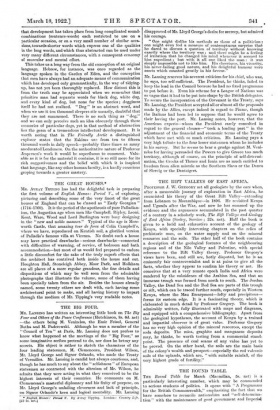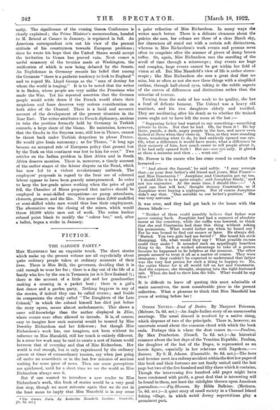THE ROUND TABLE.
Tail Round Table for March (Macmillan, 5s. net) is a particularly interesting number, which may be commended to serious students of politics. It opens with "A Programme for the British Commonwealth," emphasizing the fact that we have somehow to reconcile nationaliem and "self-determina- tion" with the maintenance of good government and Imperial unity. T.het significanee of the coming Genoa. Conference is clearly explained ; the Prime Minister's memorandum, handed. to M. Briand at Cannes in January, is reprinted in full. An American correspondent sets out his view of the present attitude of hin countrymen towards European problems;, since he wrote his hope that the United States would accept the invitation to. Genoa has proved vain. Next comes a. useful summary of the treaties made at Washington, the ratification of which is now being debated by the Senate. An Englishman in Germany records his belief that among the Germans "there is a pathetic tendency to look to England " and to regard Mr. Lloyd. George as the "man of destiny for whom the world is longing." It is to be noted that the writer is in Baden, whose people are very unlike the Prussians who made the War. Yet his repeated assertion that the German people would settle down if the French would abate their suspicions and fears deserves very serious consideration on both sides of the Channel. There is a lucid and accurate account of the development of the present situation in the Near East. The writer attributes to French diplomacy, anxious to take the position formerly held by Germany in Turkish counsels, a large sham of the blame. He maintains, however, that the Greeks in the Smyrna zone, still less in Thrace, cannot be thrust back under Turkish despotism to please France. He would give Ionia autonomy ; as for Thrace, "it long ago became an accepted rule of European policy that ground lost by the Turk on this continent was lost to him for ever." Two. articles on the Indian problem in East Africa and in South Africa deserve mention. There is, moreover, a timely account of the earlier stages of the labour dispute on the Rand, which has now led to a violent revolutionary outbreak. The employers' proposals in regard to the freer use of coloured labour appear to. have been, gravely misrepresented. In order to keep the low-grade mines, working when. the price of gold. fell, the Chamber of Mines proposed that natives should be employed in semi-skilled occupations—as pump attendants, cleaners, greasers, and the like. Not more than 2,000 unskilled. or semi-skilled whits men would thus lose their employment. The alternative was the closing of the mines, which would throw 10,000 white men out of work. The union leaders refused • point. blank to modify the "colour bar," and, after a ballot, began a strike in January.



































 Previous page
Previous page